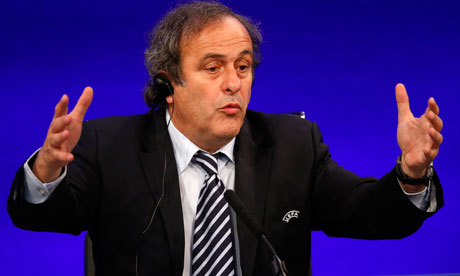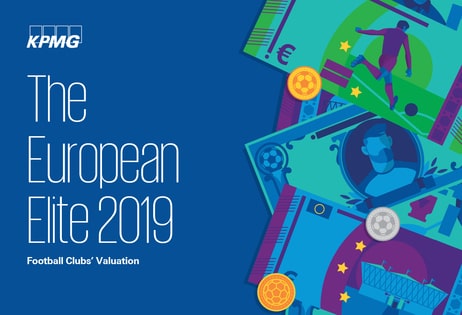"I asked my executive committee to come, and play the Champions League final here, to honour the FA for its 150 year anniversary," Platini says in that quickfire way of his, a pronounced French accent to his articulate English. "The FA is the first football association, and all the English people who went around the world and took football everywhere – instead of beating the Napoleon troops – this was good! I have to take care of the first national association of the world, and honour it."
A little rumpled at 57 in his blue Uefa blazer, Platini still carries the glint of the boy who grew into football in his father's bar in Joeuf, a mining town in his homeland's north-east, and the wit that saw him through his glory years in the France and Juventus dressing rooms. President of European football's governing body for six years now, overseeing its great competitions and reforms including financial fair play, he has, for a former player, scaled unusual heights in the sport's politics.
Talking about this, and his backing of Qatar for the 2022 World Cup which has embroiled him in controversy, Platini maintains his guiding force is to "protect" a game he still loves. He rejects the notion brewed in some quarters here that he is anti-English – "It isn't possible" – but while celebrating its grand traditions, flourishing Premier League and large crowds, he does say England has sold the game too far.
"I am not a lover of the clubs being sold. Football was created on the identification of the region, the city, the people. If you ask my opinion, to have Americans buying the clubs to make money, this is not..." he switches into French, "génial. "But it is not my problem. If you decide your clubs can be open to everybody, that's your problem."
The arrival to contest the Wembley final of two German Bundesliga clubs, controlled by their member-supporters, with domestic rules requiring financial responsibility is opportune for his arguments, about club ownership and financial fair play.
"I like what happens in Germany, you can't sell more than 50% of a club," he says. "We have Supporters Direct in England, helping fans to buy their own clubs. That's nice, that's beautiful, because it keeps the identity of the clubs, comes back to the origins of football."
The Bundesliga clubs are "in the right system," although Bayern Munich's and Borussia Dortmund's presence in the final does not, he says, denote an era of superiority on the field.
"It is cyclical. One year you are stronger, depending on the coach, players, referees. Whoever wins is the best team of that year and I give the cup to the winner. In the Champions League, there are no bad teams."
Financial Fair Play developed out of Platini's generalised worries for the game in an era awash with money, expressed when he became the Uefa president in 2007. He told the Guardian then: "It comes from my youth, my jeunesse. I am afraid of what has happened to football. We need to come back to the game."
Focussing this middle-aged man's unease into precise rules was done by Uefa's lawyers and accountants, then in consultation with the top clubs. It developed into a policy to avoid clubs falling into financial difficulties, needless in this great boom. Clubs, essentially, must not make total losses of more than ¤45m this year and last, combined.
"My job was not to protect Manchester United or Bayern Munich," Platini says, rejecting the criticism that FFP is designed to "lock in" the success of the highest-earning clubs. "It was to protect all clubs that are in financial difficulties, to protect football."
To the objection that it will prevent competition introduced by overspending clubs like Chelsea, Manchester City, Paris Saint-Germain and others backed by mega-rich owners, Platini's number-crunchers have found this is limited anyway, that 26 of last year's 30 top clubs were also the highest earners. He argues there have always been big and small clubs, and FFP is designed to encourage financial sustainability, not create a level playing field.
Uefa believes clubs can compete, not just by rampant spending, but with sensible longer-term investment and good football policies, which will be encouraged if the game's general finances are not so overheated. Dortmund, Europe's 40th highest spending club on wages and transfer fees according to Uefa, reached the Champions League final this year with their bright young team and coach, Jürgen Klopp, right on cue for this view.
Cutting through to simplify it, Platini says: "There is no problem if clubs have the money to pay the wages. My problem is if they do not have the money to pay.
"The idea is to help the clubs, not to kill the clubs. I want that Manchester City survive, that Leeds survive, that Rangers survive. I want these big clubs with big fans to survive. We are happy with the rules we have brought in, with the mentality of the rules."
He claims the same simplicity of vision and clarity of moral compass prompted him to vote for Qatar – to spread the World Cup to a region, the middle east, which has never hosted it. Yet he acknowledges that summer in the desert is not a great time for a football tournament, accepting with a disarming joke that he has never even been there in the summer: "It's too hot!"
Platini says he always told the Qataris he would vote for them, but told them the World Cup should be in the winter. He argues that, contrary to the protests from the Premier League, Bundesliga and others, leagues can reschedule that year to accommodate it.
Yet the Qatari vote is widely seen as Fifa bowing to money, with Platini cast in some coverage as too entangled in Qatari influence. Famously, he attended a lunch at the Elysée Palace with France's then president, Nicolas Sarkozy, and Qatari royalty. After that, he voted for Qatar, the Qataris bought PSG, whom Sarkozy supports, and concluded major trade deals with France. Then Platini's son, Laurent, a lawyer, was recruited as the chief executive of Burdda, a Qatari-owned sports kit company.
Platini does not dodge the truth of any of that. But he maintains he made his decision independently. "At the lunch, it was not the emir of Qatar [as some reports have said], it was the son of the emir of Qatar and the prime minister of Qatar," Platini clarifies.
The possibility of the Qataris taking over PSG was not mentioned at the lunch, he says, but states frankly: "I knew Sarkozy wanted the people from Qatar to buy PSG. I understood that Sarkozy supported the candidature of Qatar. But he never asked me, or to vote for Russia [for the 2018 World Cup]. He knows my personality. I always vote for what is good for football. Not for myself, not for France."
Platini rejects any suggestion that Burrda hiring his son, in early 2012, means he is or was compromised. "My son is CEO of Burrda, it's a company of Qatar, they have many investments. He was a lawyer for PSG [until 2008], then he was with Lagardère [the French media company], then Burrda came to pick him, because he is good. It was totally not related to anything I have done. It has nothing to do with me, and there is no conflict."
Platini talks as if the 2022 World Cup could move easily to winter, which seems to underestimate the leagues' objection that they will have to reschedule a three-year cycle, to accommodate TV. "Richard Scudamore can postpone one month," Platini says of the Premier League chief executive. "I don't know why he is saying he can't, it's his problem."
Then he goes further, saying football should skip the cold European winters, and move permanently to a summer game. He says when he first worked at Fifa in 1998, he was planning to recommend this, but pressure on Sepp Blatter from Italy and Spain prevented it. "I don't know why we always play under the snow and when it is beautiful we never play," he quips. "I totally agree with that [summer football]. I think it is a Fifa matter to discuss it."
He demonstrates again he knows his history, football's and the FA's roots in 19th century English public schools. "It is because of you, the English, that we play in winter," he grins. "You decided: rugby and football in winter, cricket in the summer."
I ask him whether the Qatari vote, and the president's good life – these best hotels, travel, his salary reported in a Swiss newspaper recently as ¤2.4m – which he refuses to discuss – has compromised his original football-man spirit, his campaigning against "ultra-commercialism."
He shakes his head. "I take big insults, like when I was a player," he says of a life lived under media scrutiny. "But I still love this game. That is why I stayed at Uefa. I have always to protect the football. All the decisions, they are for the good of football."{jcomments on}
http://www.guardian.co.uk/football/2013/may/24/michel-platini-uefa-football









































